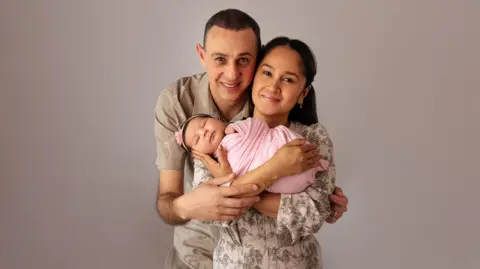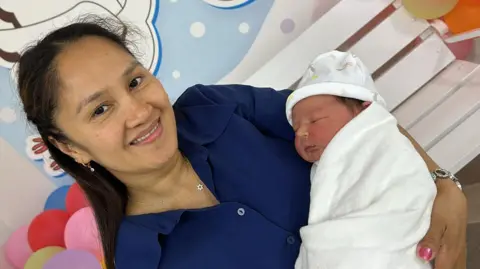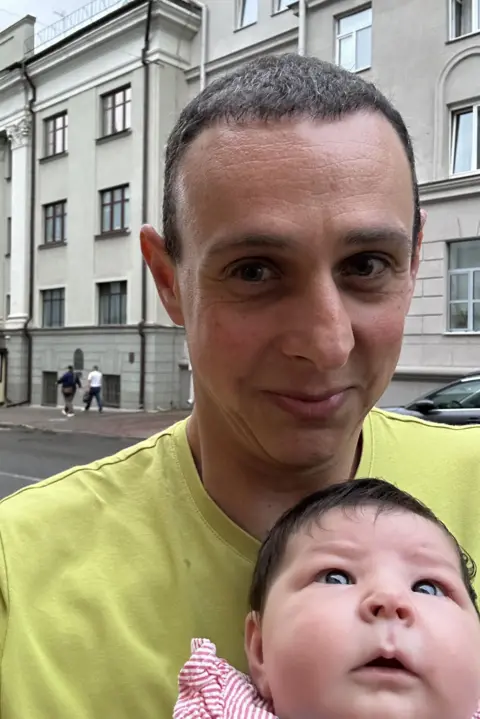[ad_1]
By Tom Campbell, PA Real Life • Victoria Cook, BBC News
 Darya Novikova/PA Real Life
Darya Novikova/PA Real LifeA couple has said their life has been made “hell” as they try to return to the UK with their daughter, who born through a surrogate mother in Belarus.
Graeme and Maura Batsman, from Harrow in north-west London, have been told that applying for baby Bella’s British passport could take another three months – but their visas to stay in the Eastern European country expire next month.
Mr Batsman has also been told he must return to work in the UK or face losing his job.
The Home Office advises that surrogacy overseas “is often complex” and can take several months.
 Family handout / PA Real Life
Family handout / PA Real LifeThe Home Office added that the Batsman’s case was a matter for the Foreign, Commonwealth and Development Office (FCDO).
It has been approached for comment.
Speaking from an apartment in Belarus, the couple criticised the “lengthy” procedures needed to get Bella back to the UK.
They said they had met couples from other countries who went through the same process “in five days”.
In addition, Mr Batsman said that once back in the UK, it would take “up to a year” for them to be recognised officially as Bella’s parents.
“We think it’s unfair that you have to go through all this to get the child and then the immigration office is just there to make your life hell for the next year for no logical reason,” he said.
The Batsmans started the surrogacy process before Belarus’s neighbour and ally Russia invaded Ukraine in 2022.
The couple explained that some people had criticised their decision to go to Belarus for surrogacy, but said: “People who have a desire to have a child don’t really care about politics.”
 Family handout / PA Real Life
Family handout / PA Real LifeGraeme and his wife Maura, who is originally from the Philippines, met in early 2021 and married a year later.
They wanted to start a family but were told they could not conceive due to medical complications and that even through IVF, their chances of success were slim.
The couple decided to explore the option of surrogacy – when a woman carries and gives birth to a baby for another person or couple.
The cost of this process in the UK can exceed £50,000, so the couple looked at other countries and eventually settled on Belarus, which they said had favourable rules.
So far, the couple estimate they have spent about £35,000 on the surrogacy process, and more than £6,000 on fees and other costs.
They said the surrogate mother, who is in her 30s and a mother of three herself, was paid around £275 a month for 10 months and a £13,000 fee once the baby was born, as well as her daily expenses.
 Family handout / PA Real Life
Family handout / PA Real LifeIn addition to passport and birth certificate applications, the couple have had to provide a letter explaining why they chose surrogacy, medical records and evidence of their stay in the country, including details of flights, hotels and insurance costs.
“There are a lot of duplicates and the UK’s legal process is just totally messed up,” Mr Batsman said.
They have asked the British government to expedite their passport application so they can leave together as a family, before they are deported without their daughter and before Mr Batsman loses his job.
Asked whether he would recommend having a child through surrogacy in Belarus, Mr Batsman said: “The desire to have a child is rather high, so people will probably do whatever they can.
“We started this two and a half years ago and it’s been a constant fight.
“I’m sure one day it will be positive, but it’s not pleasant.”
[ad_2]
Source link freeslots dinogame telegram营销




